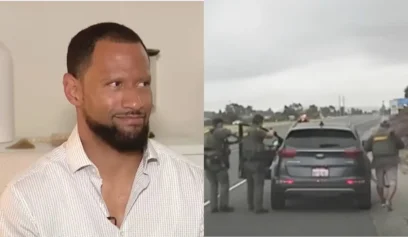A Black Oklahoma man is suing police after repeatedly being pulled over for alleged traffic violations that have left him handcuffed and held at gunpoint only for him to be let go minutes later.
Saadiq Long, 52, is a military veteran with no criminal record yet he ended up on a government terrorist watch list, prompting the potentially deadly police encounters.
“I’ve been stopped four times in basically a month,” Long told an Oklahoma police officer during a recent traffic stop.
Long’s attorneys say he’s endured violations of his constitutional rights and civil liberties by government agencies for more than ten years.

“Saadiq Long is a law-abiding American citizen, he was born here in Oklahoma and served his country in the Air Force for 11 years. He pays his taxes, works hard, and provides for his family. They are frightened that one day when Saadiq gets in his car to go to work or run errands he won’t come home,” Long’s attorney Hannah Mullen said during a news conference.
Video shared by Long’s attorneys shows some of the traffic stops he recorded himself in recent years. In one video, Long is seen with his hands up as a swarm of at least five officers approached his vehicle with their guns drawn.
Long’s federal lawsuit claims his Fourth Amendment rights are being violated by Oklahoma police by initiating traffic stops and detaining him based solely on his name listed on the Terrorism Screening Dataset (TSDS).
The TSDS was created in 2003 by the FBI and maintains the U.S. government’s consolidated terrorist watchlist. People on the list are “known to be or reasonably suspected of being involved in terrorist activity.” The list is available through the National Crime Information Center (NCIC), a system local and state law enforcement agencies regularly use.
The FBI says 98 percent of people on the list are non-U.S. persons. The list has more than a million entries and an overwhelming number of people on the list have “Arabic or Muslim-seeming names” Business Insider reported.
Long claims he has never received any explanation from the federal government on how his name ended up on its terrorist watch list or why.
“Mr. Long has been fighting to remove his name from the TSDS for several years,” Mullens told Atlanta Black Star.
In 2012, Long discovered he was on the no-fly list but successfully sued the federal government in 2015 to get his name removed. The remaining part of that ongoing litigation is focused on getting his name cleared from the TSDS.
“He has never been investigated, indicted, tried, or convicted of any crime. The federal government has never provided any explanation for turning his life upside down and placing his name on that list,” Mullen said.
As long as Long’s name is on the TSDS list, he continues to face repeated police encounters.
His lawsuit details several encounters including four recent traffic stops he experienced within a two-month timespan.
On Nov. 23, Long claims a license plate reader flagged his plates, triggering police to pull him over while on his way home from work. During the traffic stop, the officer claimed Long was driving 46 mph in a 40 mph zone. The lawsuit claims he waited for 45 minutes while his license was checked by the FBI before he was cited for speeding and let go.
On Dec. 30, he was pulled over again. The responding officer told him he was “listed under the name of a gang member” but later admitted his car was flagged on the NCIC list prompting the traffic stop. Long was let go without any citations.
On Jan. 4, he was pulled over another time because his tires “stopped past the stop bar” at a traffic light. Long was then handcuffed and placed in the back of a squad car for 20 minutes as police verified his identity before letting him go with a citation for blocking an intersection.
On Jan. 12 during another traffic stop, Long’s lawsuit says eight cop cars followed him. He was ordered to put his hands up as several officers approached with their guns drawn. He says one of the officers told him his vehicle had been reported stolen, although Long told the officers the car belonged to him. Long was still handcuffed and briefly detained during the encounter before being let go by police.
“There’s nothing in Oklahoma law that compels the Oklahoma Police Department to accept the terrorist watchlist and use it in any particular way and that’s the issue that this lawsuit is about,” Long’s attorney Gadeir Abbas said.
Long’s lawsuit is for an unspecified amount in punitive and compensatory damages “for what the city and its officers have put him through,” Mullens said.
Oklahoma City Police Department did not immediately respond to requests for comment regarding the lawsuit.
The lawsuit also calls for policy change so Long and no one else is “harassed” by police because they end up on the FBI’s terrorist watch list.


